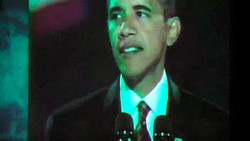Panel at YSU debates tenor of Obama’s historic win
The group consisted of professors, politicians, students and activists.
YOUNGSTOWN — Voters have proved the country has come a long way in terms of race relations, but there is still a long way to go.
That was the overall message brought forward by a group of panelists at a forum on the political, social and cultural impact of President-elect Barack Obama’s candidacy.
The forum was Thursday at Youngstown State University’s DeBartolo Hall, presented by the university’s Black Faculty and Staff Association.
The panel consisted of Youngstown Mayor Jay Williams; Shareef Ali, YSU graduate and head of a local men’s organization; YSU professors Dr. Cryshanna Jackson, Dr. Victor Wan-Tatah and Dr. Paul Gordiejew; and state Rep. Bob Hagan of Youngstown, D-60th. YSU students Paul Ruchtie and Nahed Seder also were on the panel.
Madonna Chism Pinkard served as forum moderator.
Hasheen Wilson, president of the Black Faculty and Staff Association, said the forum was needed so the public could discuss and gain a deeper understanding of the ramifications of the Obama campaign.
The public was invited to participate directly in the forum by submitting written questions to the panelists.
To the initial question concerning how Americans feel about race relations in light of the Obama candidacy, Wan-Tatah said there is still a lot of work to be done in improving that area, but the candidacy and subsequent election proved a point.
“Something has changed for sure, and something [that] has been proven is that people can be open to new ideas and making decisions based on merit,” he said.
Jackson said it may be too early to determine how people feel about race relations after the election. She said many people have called for an end to affirmative action or said blacks now have nothing to complain about, proving that race relations are still strained.
The majority of the questions, Chism Pinkard said, dealt with issues such as why is Obama, from Illinois and who is of mixed heritage (his mother was white and his father was African), considered black and the racist nature of affirmative action programs.
Williams said Obama’s being considered black can be directly attributed to the history of this country. He said, historically, anyone with a drop of black blood would be considered black in this country.
Williams also said he does not expect the Obama presidency to eradicate racism in the U.S.
He said a more realistic hope is that race will not factor into the daily decisions of citizens here and that those who do fixate on race should be relegated “to the fringes of society.”
Gordiejew said it is unrealistic to suggest that Obama has created a “post-race society” with so much more work to be done toward that end. He said society will have to work to end race issues and other colors that are divisive — colors such as the red and blue dividing states.
Some asked how Obama could make good on promises made during his campaign in an economy facing much hardship.
“There will not be a lot an Obama administration in itself can do. There will have to be a global solution to what is a global problem. He will be in a better position to interact on a global level than the previous administration,” Williams said.
Ali said it is going to take patience to find solutions to economic woes.
“Barack Obama has a very, very challenging task in putting people back to work,” he said. “He and we have to be patient. He cannot do all the things that we want him to do in 100 days or even 1,000 days. We have to be patient.”
YSU Professor Dr. Keith Lepak at one point interrupted the forum discussion by reading a published selection that suggested some of Obama’s supporters were “bargainers” voting for Obama to escape the stigma of being considered racist.
Jackson said Obama had faced criticism for not addressing “African-American” issues and had to find a way to appeal to a broad spectrum of society, including those who may have been seen as bargaining their vote.
jgoodwin@vindy.com
 43
43

